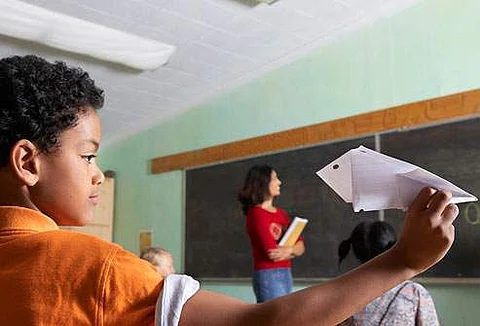

On any given day, Rohan's* screen time never exceeded an hour. The seven-year-old mostly played concentration games and solved puzzles on the gadgets, while his mother Reena* sat next to him. "This helped with his ADHD," she says by way of explanation.
However, things are apparently not the same anymore. With the schools in Kerala reopening online for the new academic year, owing to the COVID-19 pandemic, many children with learning disorders, including Rohan are forced to spend hours in front of gadgets and TV screens, to attend their classes. However, parents, teachers and experts tell us that this isn't doing them any good.
"It's quite noisy," Reena often hears Rohan say this while attending his lectures via Zoom. "He is not able to understand where the sounds are coming from. He has speech issues too," Reena tells us. And for her, it is quite 'heartbreaking' to see her little one struggling to grasp what is being taught online, while the others in his class seem to follow everything seamlessly.
Unlike earlier, Rohan now spends four hours in front of the screen. This includes three hours of lecture and an hour of his regular screentime. "We have been keeping him away from this for a long time. Now, all of a sudden, gadgets have become a part of his life. He is quite confused and doesn't quite know what is happening around him," she says. "It was much easier for a child like him to grasp things from a teacher. Now, he doesn't even try," she says poignantly.
A petition by the advocacy group Together We Can, to the Kerala Chief Minister Pinarayi Vijayan notes this issue. It draws light on how the Rights for Persons With Disabilities Act (RPWD) and inclusive education norms of differentiated teaching, peer support and more is completely a miss with online education. "The angst amidst the parents of children with disabilities across variousmainstream and special schools is thus understandable. Most importantly education is not about sustaining schooling. Education helps children gain knowledge of the world around us so that they can change it into something better," reads the petition. "lt should develop in them a perspective of looking at life. lt should help them build opinions and have points of view on things in life. lt is not just about lessons in textbooks. lt is about the lessons of life," it says. Seema Lal, a member of the group tells us that no discussion was conducted with the stakeholders before laying down the online education norms.
Chithra Vinod, a special educator agrees with this point of view. She says, "With online learning, there is no one-to-one connection with the students. It is quite difficult for us to make the child understand their lessons." Chithra notes how a lot of children sit idle in front of the screen during their sessions and do not participate in the class. "I have to cross-check with each of them to know if everything is in place and if they're able to understand what is being taught. Other children would tell you voluntarily, but that isn't the case here. Now, with classes going online, I take more than double the effort that I used to before," she adds.
Now on the other side of this spectrum, Reena shares her worry as a parent. "Every day, I see my child struggling his way to attend these classes. I see him disappointed all the time. This is putting me under so much stress too," she says. "But I don't share this with any other parent. They just don't get it. They have perfect kids," she adds.
